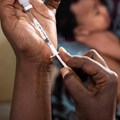Boosting vaccine rollout and debunking Covid-19 myths

In 2020, herd immunity for South Africa was initially estimated at 67% but this was before the emergence of variants.
As the Covid-19 virus has increased in transmissibility, our target has moved closer to 90% and while herd immunity seems out of reach with these highly transmissible variants, it's still critical for as many people as possible to vaccinate. This is necessary to protect individuals from severe illness and death and reduce the strain on healthcare resources.
To achieve this, we must address vaccine hesitancy through educational and awareness initiatives that focus on busting the myths and misconceptions around its safety, while ramping up on availability and accessibility of the vaccine. We should also be shifting discussions away from herd immunity toward finding a way to live with the virus, and it is the vaccine that will make this possible, even if we do not reach the herd immunity threshold.
Accepting hard truths
Herd immunity is unlikely to materialise during our lifetime. Continuing to push this notion creates a false hope that we can get to a point where the virus is eliminated, which is unlikely as the virus will simply continue to circulate and evolve. Pushing people to think it is possible to achieve herd immunity as a means to drive vaccine uptake, has its own risks. It's likely to damage confidence in vaccines, because even if we do achieve our national target of 67% of the population there will still be outbreaks of Covid-19. This will lead people to start doubting the benefits of being vaccinated.
Failing to accept that herd immunity is unlikely will mean that authorities will insist that ongoing restrictions are the only way to stay safe. This is the most dangerous of all, as it compromises the lives of all South Africans in every single aspect, whether it be work, home, family, education, mental health or recreation; everything is affected.
Exacerbating the situation is an inequitable
Overcoming hesitancy through myth-busting
As humans, it's natural to be mistrustful of that which we do not understand. This is why it's important to combat misinformation around the virus and vaccines while focusing on the ultimate goal: creating some semblance of normalcy by finding a way to live with the virus. A large part of this involves addressing fears about the safety of the vaccine.
* Myth: It takes at least a decade to develop a vaccine. This one was developed and approved too quickly. It can't possibly be safe.
Reality: An international research program had already started researching the production of the SARS-1 virus vaccine 10 years ago. The main element of the vaccine is the carrier molecule, which had already been through advanced trials. By switching the SARS-1 antigen for the SARS-2 antigen, scientists were able to conclude trials in under 12 months.
* Myth: The risks associated with the vaccination are higher than the risks associated with Covid-19 infection.
Reality: There is an overwhelming amount of evidence irrefutably showing that the vaccination protects
* Myth: The Covid-19 vaccine will affect fertility negatively.
Reality: Concerns about the vaccine impacting negatively
* Myth: The vaccine will infect individuals with the virus, and they can infect others.
Reality: An infected person spreads the virus through coughing and sneezing, which is why measures like mask-wearing, social distancing, and isolating when sick, are in place. However, NONE of the approved Covid-19 vaccines available are made using a live virus, which means that they cannot infect you.
* Myth: There's no point in getting the vaccine if it doesn't protect from new variants.
Reality: Different variants respond differently to various vaccines. Overall, vaccination may not prevent infection, but it has been shown to significantly reduce infection severity and mortality.
* Myth: The vaccine changes an individual's DNA.
Reality: This is not a comic-book universe, and the vaccine will not alter an individual's DNA in any way. If anything changes an individual's DNA, it is the virus that infects the cells in the body. The DNA/RNA of the virus joins the cell's DNA and forces it to start replicating the virus DNA/RNA which eventually destroys the host cell. The vaccine does NOT change the cell's DNA as it does not cause infection. Instead, the Covid-19 vaccine carries a protein similar to the virus antigen, which is enough to trigger the body's immune cells to produce antibodies to the virus as well as store this information in the immune system for future use.
Step up accessibility
Individually and collectively, we have a responsibility to ourselves and others to get vaccinated. As helpless as each of us has felt throughout the pandemic, the one thing that we can do is get vaccinated, and we can ensure that our loved ones do too. As we focus on increasing our nationwide vaccine rollout capability to meet the demand for vaccines, we're going to have to get creative with accessibility and make it as easy as possible.
Here, with most medical resources permanently employed at hospitals, limited access to sufficient qualified professionals to administer the necessary vaccinations is a potential stumbling block. This can be avoided through the use of Temporary Employment Service (TES) providers in the healthcare space. Therefore, to provide sufficient vaccination facilities across the country to offer locals the opportunity to get vaccinated as quickly and conveniently as possible, we will need more trained professionals to administer vaccines.
In addition to fixed vaccination facilities, it will be necessary to provide a service that brings the vaccine directly to people, in their homes, workplaces and especially for those who struggle with mobility. TES workers are ideal for getting the vaccines to people through that last mile. They can be deployed anywhere in South Africa for any duration of time, providing the flexibility and agility to respond to changes in vaccine demand without diverting any critical human resources from frontline Covid-19 healthcare.




































